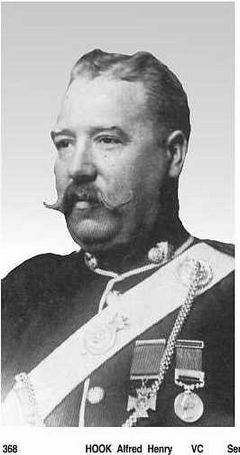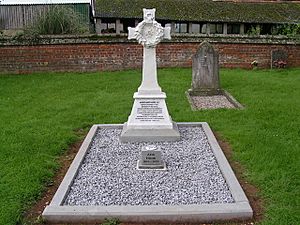Henry Hook (VC) facts for kids
Quick facts for kids
Alfred Henry Hook
|
|
|---|---|
 |
|
| Born | 6 August 1850 Churcham, Gloucestershire |
| Died | 12 March 1905 (aged 54) Gloucester, Gloucestershire |
| Buried |
St Andrew's churchyard, Churcham
(51°51′42.2″N 2°20′15.1″W / 51.861722°N 2.337528°W) |
| Allegiance | |
| Service/ |
|
| Years of service | 1877–1904 |
| Rank | Sergeant |
| Unit |
|
| Battles/wars | |
| Awards | Victoria Cross |
Alfred Henry "Harry" Hook (born August 6, 1850 – died March 12, 1905) was a brave English soldier. He received the Victoria Cross, which is the highest award for bravery in the face of the enemy. He earned this special medal for his actions during the famous Battle of Rorke's Drift.
Contents
Early Life and Military Service
Alfred Hook was born in Churcham, a small village in Gloucestershire, England. Before joining the regular army, he served for five years in a local military group called the Monmouth Militia.
In March 1877, when he was 26 years old, Hook joined the main British Army. He fought in the 9th Xhosa War in 1877. Later, he was part of the Anglo-Zulu War. During the Battle of Rorke's Drift, he got an injury to his head.
Hook left the regular army in June 1880. However, he continued to serve for 20 more years in a volunteer army group called the 1st Volunteer Battalion, Royal Fusiliers. He became a sergeant-instructor, teaching other soldiers.
He received his Victoria Cross medal on August 3, 1879. It was given to him by Sir Garnet Wolseley, a top general in South Africa. After leaving the army, Hook worked at the British Museum. He first cleaned inside the museum. Later, he was promoted to look after visitors' umbrellas. He retired in 1904 because he was not well. Alfred Hook passed away on March 12, 1905, from a lung illness called pulmonary tuberculosis. He is buried in the churchyard of St Andrew's in Churcham.
Heroic Actions at Rorke's Drift
Alfred Henry Hook was a Private in B Company of the 2nd Battalion, 24th Regiment of Foot. This unit later became known as The South Wales Borderers. He was 28 years old when the Anglo-Zulu War took place.
On January 22, 1879, Hook and five other soldiers were given an important job. They had to protect about 30 patients who were too sick or injured to move. These patients were in a temporary hospital at Rorke's Drift station in Natal, South Africa.
During the night of January 22-23, 1879, Zulu warriors attacked Rorke's Drift. A distant room in the hospital was defended for over an hour by three soldiers. When they ran out of bullets, the Zulus broke in. One soldier and two patients were killed. However, one of the soldiers, Private John Williams, managed to make a hole in the wall. He helped the last two patients get into the next room. There, he found Private Hook.
These two brave soldiers worked together. One soldier used his bayonet (a knife attached to a rifle) to keep the enemy away. The other soldier broke through three more walls. This allowed them to bring eight more patients to a safer part of the hospital. Their actions saved many lives during the intense battle.
The Victoria Cross Medal
Alfred Hook's Victoria Cross medal is on display. You can see it at the South Wales Borderers Museum in Brecon, Powys, Wales.
Interesting Fact
The punk singer Mark E. Smith once said that Alfred Hook was an ancestor of his father. Because of this family connection, the Smith family was invited as special guests to a showing of the movie Zulu in Whitefield. The movie is about the Battle of Rorke's Drift.
 | Precious Adams |
 | Lauren Anderson |
 | Janet Collins |


